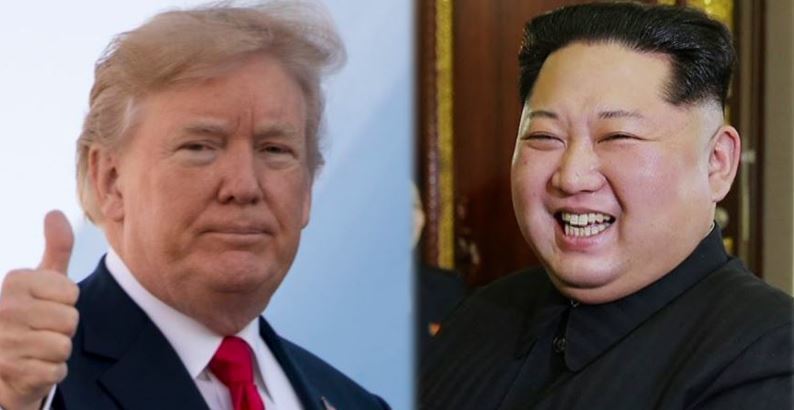 |
|
US President Donald Trump and North Korean leader Kim Jong-un
|
Percentage of people who view NK’s nuclear program as serious threat decreases from 2017
Seventy-seven percent of Americans support establishing diplomatic ties with North Korea if it abandons its nuclear weapons, an opinion poll shows. The percentage of Americans regarding North Korea’s nuclear program as a serious threat to the US stood at 59%, down 16 percentage points from 2017. The Chicago Council on Global Affairs (CCGA), which conducts yearly opinion polls on Americans’ perceptions of foreign policy and foreign affairs, released the July poll findings in an annual report published on Oct. 1. In the poll, 59% of respondents said they viewed North Korea’s nuclear program as a serious threat to the US. In past CCGA polls, the percentage of respondents perceiving the North Korean nuclear program as a threat rose from 55% in 2015 to 60% in 2016 before climbing as high as 75% last year. The latest results showed the level dropping back to 59%. “In 2018, the tensions between the United States and North Korea receded from their 2017 highs after Trump surprised the world by agreeing to meet with Kim in Singapore in June,” the CCGA said in its report. “That easing of tensions is reflected in American public opinion,” it continued. But the results still showed Americans viewing North Korea’s nuclear program as the second largest threat after international terrorism (66%). Among the different suggested forms of North Korea policy approach in the event that Pyongyang reaches an agreement with Washington to abandon its nuclear program, “establishing diplomatic relations” received the highest level of support at 77%. Respondents also showed relatively high levels of support for “providing economic and humanitarian aid” (54%) and “partial withdrawal of US troops from South Korea” (54%). In contrast, support was relatively low for “cancelling US-ROK military exercises” (44%) or “complete withdrawal of US troops from South Korea” (18%). Among suggested policy options if North Korea does not abandon its nuclear program, respondents showed the strongest support for “imposing tighter economic sanctions” at 77%. Support for military actions such as “airstrikes on the North’s nuclear facilities” and “sending US troops to overthrow the King Jong Un regime” was relatively low at 37% and 25%, respectively. Just 29% of respondents agreed that North Korea’s nuclear weapons capabilities should be acknowledged on the condition that it does not produce any additional weapons, while 13% favored acknowledging its nuclear weapons capabilities and production outright. Seventy-four percent of respondents agreed on the continued stationing of US Forces Korea – an area where US President Donald Trump has expressed negative views. The rate of support among Americans for the stationing of troops has consistently climbed, up from 60% in 2012 and 70% in 2016. Support for the stationing of US troops in Japan and Germany was relatively lower at 65% and 60%, respectively. Sixty-four percent of respondents supported the US defending South Korea in the event of a North Korean attack on it. The rate of positive response to the same question has consistently risen from 30% in 1998 to 41% in 2008, 40% in 2010, 47% in 2014, 62% in 2017, and 64% this year. Favorable views of South Korean President Moon Jae-in stood at 67%, up 13 percentage points from the year before. In contrast, 91% of respondents showed negative views toward North Korean leader Kim Jong-un, while just 6% expressing a favorable view. The CCGA poll was conducted online by GK Custom Research with 2,046 adult Americans over the age of 18 between July 12 and 31 following the Apr. 27 inter-Korean summit and June 12 North Korea-US summit. The results had a margin of error of ±2.37 percentage points. The survey received support from the Korea Foundation, the John D. and Catherine T. MacArthur Foundation, and businessman Lester Crown and his family. Founded in 1992, the CCGA is an independent, non-partisan institute conducting policy research on US foreign policy and public opinion, including yearly polls on Americans’ views of foreign policy and foreign affairs. Its president is Ivo Daalder, a former European policy director for the White House National Security Council and US permanent representative to the Council of NATO. By Hwang Joon-bum, Washington correspondent Please direct comments or questions to [english@hani.co.kr]






